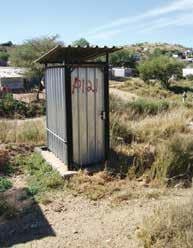 Cape Town Mayor Patricia de Lille has denied that the City of Cape Town is not spending enough on sanitation after she was served with a petition ahead of her 2016/17 budget speech last week.
Cape Town Mayor Patricia de Lille has denied that the City of Cape Town is not spending enough on sanitation after she was served with a petition ahead of her 2016/17 budget speech last week.
Accusations levelled against CT
In a lengthy submission to by the SJC on the Cape Town 2016/17 draft budget, dated 29 April, the coalition claims that capital spending for sanitation infrastructure is disproportionately low and declining. It reports that the allocations and share for informal settlements have decreased year on year, despite an increase in the total water and sanitation capital budget over the same period. The SJC also alleges that the City misrepresents the constraints to installing sanitation infrastructure in informal settlements in Cape Town. “The City is providing toilets by increasing the number of temporary toilets,” states the document.“The City is choosing to implement temporary services in long-term environments, which is a violation of the constitutional rights of informal settlement residents.”
De Lille responds
De Lille responded to the accusations made by SJC in her budget speech. She stated that, in a world of limited resources, everything has to be planned for and shared among more than 200 informal settlements, and that the city has made many investments where we can to give people dignity. “When we are not able to provide full-flush toilets, it is for the following reasons: full-flush toilets cannot be legally installed on privately-owned property, in areas of extremely high density, under power lines, on landfill sites, in a road or railway buffer, within servitudes, outside the urban edge, in water retention ponds and floodplains,” she said. “Up to 82% of informal settlements are either fully or partially affected by one or more of the above-mentioned constraints. “Alternative sanitation types such as the portable flush toilet (PFT) or chemical toilets are provided when and only when it is not possible to install water-borne infrastructure.” Despite these constraints, the city’s proposed water and sanitation budget for 2016/17 direct spend in informal settlements is in fact an increase compared with last year: R559.7 million this year versus R503.7 million last year. “What is not taken into account is the bulk infrastructure to support the toilets, such as wastewater treatment facilities or the bulk water operations which are much more expensive than the provision of toilets and taps, and from which informal settlements also benefit,” said De Lille.Water and sanitation budget
De Lille then went on to give the budget numbers for water and sanitation, as follows:- Water and Sanitation are spending over R779 million in poorer areas, including for backyarders and informal settlements
- R100 million that is planned for upgrades to the Zandvliet Wastewater Treatment Works which services Khayelitsha
- A new water supply from Baden Powell to Khayelitsha is planned to commence in the 2016/17 financial year at a cost of R45,4 million over a three-year period
- The Borcherds Quarry Wastewater Treatment Works is also being upgraded; the total cost over three years amounts to R174,5 million. A key part of this is the upgrade of the Stercus where all alternative sanitation types are taken for emptying and cleaning. The cost of upgrade for 2016/17 is R50 million
- R113 million is planned for the completion of Cape Flats 3 bulk sewer and this serves residents in poorer areas
- In support of housing projects largely for the benefit of the poor, over R28 million is set aside for bulk water and sewers
- The Mitchells Plain Wastewater Treatment Works is undergoing upgrades for a planned R50,5 million, again mostly servicing people in poorer areas
- And in general, the R74,6 million being planned on sewer and water network upgrades city-wide will serve those living in poorer are






